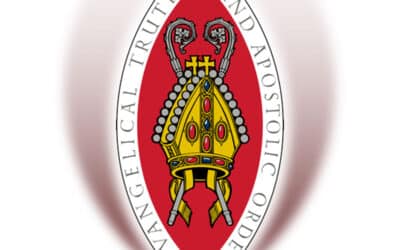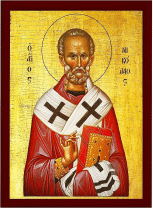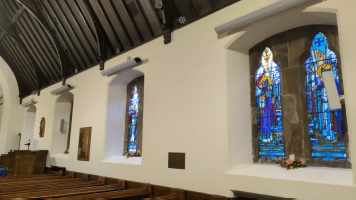
Collect
Lord of life and power, through the mighty resurrection of your Son you have overcome the old order of sin and death and have made all things new in him. May we, being dead to sin and alive to you in Jesus Christ, reign with him in glory, who with you and the Holy Spirit is alive, one God, now and for ever. Amen.
Gospel John 20: 1 – 18
Early on the first day of the week, while it was still dark, Mary Magdalene came to the tomb and saw that the stone had been removed from the tomb. So she ran and went to Simon Peter and the other disciple, the one whom Jesus loved, and said to them, ‘They have taken the Lord out of the tomb, and we do not know where they have laid him.’ Then Peter and the other disciple set out and went towards the tomb. The two were running together, but the other disciple outran Peter and reached the tomb first. He bent down to look in and saw the linen wrappings lying there, but he did not go in. Then Simon Peter came, following him, and went into the tomb. He saw the linen wrappings lying there, and the cloth that had been on Jesus’ head, not lying with the linen wrappings but rolled up in a place by itself. Then the other disciple, who reached the tomb first, also went in, and he saw and believed; for as yet they did not understand the scripture, that he must rise from the dead. Then the disciples returned to their homes. But Mary stood weeping outside the tomb. As she wept, she bent over to look into the tomb; and she saw two angels in white, sitting where the body of Jesus had been lying, one at the head and the other at the feet. They said to her, ‘Woman, why are you weeping?’ She said to them, ‘They have taken away my Lord, and I do not know where they have laid him.’ When she had said this, she turned round and saw Jesus standing there, but she did not know that it was Jesus. Jesus said to her, ‘Woman, why are you weeping? For whom are you looking?’ Supposing him to be the gardener, she said to him, ‘Sir, if you have carried him away, tell me where you have laid him, and I will take him away.’ Jesus said to her, ‘Mary!’ She turned and said to him in Hebrew, ‘Rabbouni!’ (which means Teacher). Jesus said to her, ‘Do not hold on to me, because I have not yet ascended to the Father. But go to my brothers and say to them, “I am ascending to my Father and your Father, to my God and your God.” ’ Mary Magdalene went and announced to the disciples, ‘I have seen the Lord’; and she told them that he had said these things to her.
Reflection by Rev. Canon Drew Sheridan
I was in Tescos Lanark the other day. As I wandered up and down the aisles I encountered – at a safe distance of two metres, of course! – someone from the neighbourhood of the Rectory, with whom I often stop to have a wee blether! As we stood two trolleys apart I could sense that she wasn’t her usual jolly self; there was a heaviness about her which prompted me to say: “Oh, cheer up! It’ll soon be Easter!” To which she replied: “Do you know, son, I’m just no feelin’ it this year! All this Coronavirus stuff is getting me right down in the dumps!” I felt crass for making such a throwaway comment, because, when her reply came back to me, I knew instantly what she meant! And that made me think about what I meant when I told her it would soon be Easter! So when I got back home I went straight to the Gospels and had another, closer look at the old, old story that is so central to our Christian faith. As I read I was forcibly reminded that, when Mary came to the tomb on the first Easter morning, she was a woman totally wracked with grief.
Her world had been torn apart. She had lost her friend unexpectedly and in the most brutal of ways just a short 72 hours before. Nothing, she felt, would ever be the same again. As she stumbled her way from missing body, to strange gardener, to dawning realisation, there was no quick end to her sadness, no speedy recovery from the deep bereavement she was in. Her “Jesus is risen”, blurted out to the disciples, was the incredulous statement of one who was only beginning to see the world in a new light. She couldn’t see it with full clarity yet, but she had started to get there.
And there is truth in that for all of us. The fact of Easter doesn’t take the fear, pain and struggle out of life, but, over time, it does give us strength not to be overcome by these things. After the trauma, slowly, gradually we receive grace to carry on. It’s only when we have contemplated the awfulness of darkness that we can truly appreciate the light. Slowly, gradually. It’s only when we travel through a cold winter, full of stinging sleet and slicing ice that we can truly welcome the new Spring, slowly, gradually removing our heavy winter clothes to don lighter garments more appropriate to the warmer temperatures of the new season.
For all of the disciples the death of Jesus hadn’t just been the loss of a friend, it had also been the destruction of their hopes. As they would mutter to one another despondently on the Road to Emmaus: “we had hoped that he was the one.” Those words encapsulate so much of our human experience, when our political, social, personal, health, romantic, career desires and aspirations are so cruelly dashed and lost. Everything that the disciples had been striving and living for over the last three years had suddenly been wiped out. For the disciples, hearing “Christ is risen” wasn’t an instant cure; it was only the first slow step towards the rebirth of their dreams for the new world they had been striving for along with Jesus.
That is why the Church continues to mark Easter only after it has been through the rigours of Lent and Holy Week. In Holy Week we are invited to consider Christ’s physical sufferings, and on Good Friday we plunge ourselves into the hope-crushing anguish of his death. Against that background the exclamation “Jesus is alive” takes on a deeper meaning. As Martin Luther King put it, we begin to be able to “accept finite disappointment, but never lose infinite hope”.
So while Easter is our bright, bright Christian hope, it doesn’t shirk from facing the darkness. The Easter story’s devastating disappointments, undeserved suffering, injustice, denial, desertion, betrayal, torture, humiliation and death pulls absolutely no punches. And yet, throughout it all, Easter proclaims that God in Jesus will always have the last word. With him, darkness will never prevail. As scripture says: God “has given us a new birth into a living hope through the resurrection of Jesus Christ from the dead, and into an inheritance that is imperishable, undefiled, and unfading.” So, thanks to my neighbourhood friend, whose honest response to my glib offer of Easter comfort sent me away with a flea in my ear to think again, I now think I will be able to say with more conviction and sensitivity this year – It’s Easter. Yes, it’s Easter. And Christ is risen, he is risen indeed! Alleluia!




